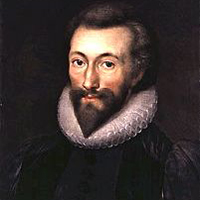Death, be not Proud by John Donne: Summary and Analysis
Death, be not proud is one of the best poems of John Donne which is holy Sonnet 10. It was written in 1610 and was published in 1633. The title of the poem comes from its first line. Donne highlights his Christian belief taking reference from Bible Corinthians 15:26, where Paul writes 'the final enemy to be destroyed is death'.

John Donne (1572-1631)
The death is personified and the speaker brings forth an argument; the argument is that Death is not all powerful as we are forced to think. Finally, Death gives us the way to the eternal life, a kind of freedom from this worldly sorrow. Death is just a sound sleep from which we will awake at the Day of Judgment. From that day, there will not be death. On that very day, Death dies. So, there is no reasoning in fearing of Death and Death too does not have any logical reason to be proud of.
At the beginning of the poem, Death is shown as mighty and dreadful as it has the power to take the lives of all. But, the speaker denies its power immediately saying ‘poor’ death and announces that it will not kill him. He presents his idea of afterlife and says that death is just a way to the never ending world of pleasure and life. He strongly says people never die. The age old characterization of the Death is turned upside down by the speaker. The speaker criticizes the Death for its illusionary pride. Actually, for the speaker, Death is a slave to other unseen forces of the universe like destiny, coincidences, kings and desperate men. Death becomes a passage from worldly weariness, pain, failure to the eternal pleasure and happiness. Death is more peaceful than the rest and sleep, which ultimately restores energy.
The speaker proves that the Death is only connected to the negative and destructive forces of the life such as, poison, battle, sickness, accidents et cetera. Opium and other drugs can bring sound sleep better than the Death. Because of the servile nature of the Death and its connection with the evil events of the life of a human being, Death should not be proud. Death itself has finality and end on the Day of Judgment, but human beings have life after death which is eternal.
Donne applies his characteristic metaphysical wit in the choice of structure, poetic techniques, language, irony, and paradox. This Sonnet follows Shakespearean form of three quatrains and a concluding line, but the rhyming pattern is that of Petrarchan: abba for the first two quatrains, forming an octet. The assured tone of the speaker in Death, be not Proud, and the straight verbal clash to the Death delivers an ironic sense of security to the readers by indirectly suggesting that Death is not to be feared at all, and it too has to face the end by the greater force in the Day of Judgment.
Related Topics
 |
bachelorandmaster.com |